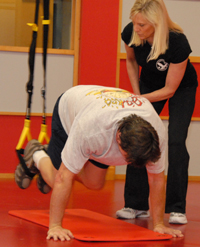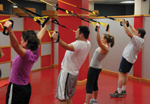|
|

|
Students get hang of class
|
by Dawn Brazell
Public Relations
Some might say Janis Newton just leaves people hanging.
 Janis Newton checks Don Gibson's alignment as he performs a reverse crunch using the TRX suspension training system. Janis Newton checks Don Gibson's alignment as he performs a reverse crunch using the TRX suspension training system.
Of course, she would tell them that’s her job, and she’d be right.
Newton, program director at MUSC’s Wellness Center, instructs TRX
classes that use suspension training to get people into shape.
Participant Ashley Snider, Ph.D., a post-doctoral scholar in the
Department of Medicine, said that she enjoys “hanging out” with the
group.
“It’s awesome. It’s unlike any other workout that I’ve ever tried. In
the four weeks since the class started, I have noticed a big difference
in my own overall strength and balance.”
That’s a big endorsement for Snider, who also teaches exercise classes
at the wellness center. One difference in the class is how well it
targets core strength through the suspension training. Suspension
training means that the hands or the feet are suspended and supported
by a single anchor point during movements. The workout offers
variations to increase resistance by using gravity and body weight to
manipulate the difficulty of the exercises.
The wellness center began offering the suspension training classes last
December in six-week, small-group sessions. Snider compares it to a
group personal training class. The smaller class size means everyone
gets personalized attention. “They’re not like drill sergeants, but
they want to make sure you get the most out of it.”
TRX suspension training originally was created by former Navy SEAL
Randy Hetrick. Hetrick and his teammates needed a way to stay in peak
condition with minimal fitness equipment. The workout is designed to
intentionally displace a person’s center of gravity to activate the
core musculature during the exercises. The training has spread from
branches of the U.S. military to Olympic training centers and fitness
facilities.
 Participants use the suspension to do core, abdominal exercises. Participants use the suspension to do core, abdominal exercises.
Newton said the class is a perfect way to add variety to workouts and
to cross train for core strength and stability. The center’s TRX
Performance Program also includes other training equipment such as
kettlebells, and is geared to be appropriate for all ages and fitness
levels, she said. “This workout is easy to modify for the
beginner. It is designed for easy progression as the participant
improves fitness. Just like most workouts, power and speed can be
added as the participant needs added intensity.”
Newton said she likes how the class uses a person’s body and gravity to
create a challenging workout. “Some of the TRX mottos are: 'All Core -
All the time', 'All levels, all places, all goals', and 'Make your body
your machine'. Once you finish a workout with TRX, you will
understand these mottos. It’s one of the best core workouts I’ve
ever done. You will truly enhance your kinesthetic awareness of your
body.”
People can sign up for the classes, limited to 12 participants, at the
wellness center’s membership desk. The class is team taught by
personal trainers, two of whom hold TRX certifications. For more
information, go to http://www.musc.edu/hsc, look under the What’s New section and click on TRX suspension training or contact Newton at newtonj@musc.edu.
New four-week sessions begin monthly and cost $45 for members, $100 for
non-members (includes a one month membership) and $35 for students.
Friday, Feb. 19, 2010
|
|
|




